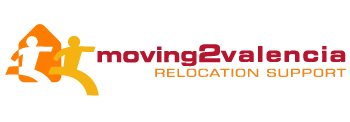Moving to Valencia with kids. A wonderful adventure for the whole family! A guide to the Valencian education system and how to enrol.
After the first excitement of deciding to move your family to Valencia the concerns start. How am I going to find a school for my children? How do I enrol them? Do they need to know Spanish? Or Valencian? Do I? How do government and private schools work? And which one is the best option for my children?
It can all seem very confusing at first. But the Spanish education system is luckily quite straightforward.
There are basically three kinds of school:
Colegio público, or government schools: they are owned and run by the government and teachers are government employees who have to pass a very hard exam to get their position. These teachers can not be fired, only relocated.
Colegios concertados, or semi-public schools: they are privately owned but government-subsidised and have to follow the national curriculum. Their teachers are not government employees and can be hired and fired as the school pleases.
Colegios privados, or private schools: they are private and free to teach and hire however they want. They do not have to follow the national curriculum, or even teach in Spanish.
This article is about government and semi-public schools and the bureaucratic process of registering your children. We’ll have another one very soon explaining private schools.
The Spanish education system
In Spain school is compulsory from 6, when children start primero de primaria (1st grade of primary). However when children are 3 they can already go to colegio infantil, similar to nursery or kindergarten. Many schools are now offering free schooling for children aged 2. It’s important to note, that education is mandatory and even though homeschooling is legal in Spain it can cause legal problems to parents.
The stages of the education system in Spain are:
Educacion infantil de primer ciclo: from birth to 3. Parents have to pay for these first years, but now many schools are offering free services for children aged 2 and above.
Educacion infantil de segundo ciclo: from 3 to 6. Not mandatory but because it is free in government schools almost all parents choose to send their children.
Educacion primaria: from 6 to 12. Compulsory for all children. Children start in the morning and finish around 4.30 or 5PM, and they are allowed to leave the school and go home for lunch or they can stay in the premises and eat at the comedor (lunch hall).
Educacion secundario obligatoria (ESO): from 12 to 16. Compulsory. Classes usually start around 8.30, and afternoon classes start around 3 until 5. Or from 8.30 to 14.30. ESO students can start making some choices about what subjects they want to study.
Bachiller: from 16 to 18. Not compulsory but chosen by many students. At the end of the two years students who wish to continue studying at university or high level vocational training must sit an exam called Selectividad. In Bachiller students can choose one of several branches depending on their interests.
All schools in Spain teach in Spanish, but in places where there is a second official language (like Valencian in Valencia) the second language is also used in School. In the past parents could chose which language to make the main one for their children’s education during the primary and secondary school years in all schools. But recently a new law was passed that forces schools to choose one of 6 levels from everything in Spanish (except for the Valencian language class) to all Valencian (except for the Spanish language class). The option with the most Valencian is also the one that offers the largest number of classes in a foreign language (usually English, but French is chosen by some schools).
When children enrol in a school and they don’t know one (or both) of the local languages they will receive special beginner classes until they can join the rest of the class. Luckily children learn languages easily and adapt incredibly fast. Usually the main language of the school is the one that is taught first.
In the city most people use Spanish as their main language, and even if children go to a mostly Valencian-speaking school they use Spanish among themselves. Outside of the city, some towns are mostly Valencian-speaking and Valencian is the language heard on the street. It is also important to know that all teachers in schools in Valencia must know Spanish and Valencian. In theory they also have an intermediate knowledge of English (at least B1) regardless of the subject they teach, but the reality is that the exams are mostly written and grammar-based so their conversation skills are usually quite basic.
Concertados are the same as government schools when it comes to curriculum and languages. They are free but usually offer ‘extras’ that are paid for by parents. These extras include clubs, workshops, art classes, and sports; or they can add resources or time to the government curriculum. These schools cost between 30€ to 120€ per month. Most concertados have a religious character, usually Catholic or another Christian denomination, when government schools are non-religious.
Finding a school
There are two ways of registering your child in school depending at which point of the school year you do it.
No matter what time of the year you do this, you first need to register with the council in the padron (council registration list), as you will need a copy of that to begin the registration process.
Keep in mind that students are sorted by age, not by level. If you are coming from the Southern hemisphere depending on when your children were born they could be put a year ahead or behind the one they were doing back home. Also, most semi-public schools have a waiting list.
Within the official registration period (May).
You will have to fill in a pre-registration form (formulario de pre-inscripcion) in which you can list up to 10 schools in order of preference. If you don’t qualify for your first choice, then the second choice will be checked and so on. This form has to be handed in to your first choice school. During May schools have open days when you can visit them, see what they offer and inquire about open spaces.
School registrations are done on a points-based system. Many aspects are taken into account, including: closeness to the school, enrolled siblings, parents working at the school, disabilities…
At the beginning of June a provisional admission list is published by each school. You have to go to each school in person, as this is not online. After this you can enrol your child to the school that admitted them. All schools have a different timetable, so make sure you check with them so you don’t miss any important deadlines.
Outside the official registration period, or escolarizacion extraescolar.
You will need to go to the education authority (conselleria d’educacio) where you will be given a list of schools local to you that have open spaces. With that you can book a meeting with the schools.
Once you have chosen a school, you need to go back to the education authority to get the official registration form that you can take to your school of choice to start the process. Government schools usually have 1 or 2 spaces for children to enrol outside of the regular registration period.
Documentation needed
All children need to present:
> copy of the padron (registration with the council)
> original passports of the parents or European ID card
> ID documents for the children, either birth certificates (international or certified by public notary), addendum to parents’ passport or family book
> medical report certificate (issued by their Spanish family doctor) where vaccinations received are shown
> previous year school results, for those enrolling after the second year of primary (most schools request a Spanish translation)
> authorisation by the education authority if enrolling outside of the official period
Regardless of what many online publications say, you do not need to present a NIE card to enrol children in school.
My personal experience: Christa, relocation specialist at moving2valencia
I have 14 years of experience with the Spanish education system in government and semi-public schools through my children. I have two children, aged 12 and 16, who now speak Spanish, Valencian, English and our mother tongue Dutch with ease.
In my experience the Spanish education system is very conservative and children are expected to learn by heart from books. There is usually little room for creativity, self-initiative or project-based learning. During primary school there is heavy emphasis on homework. After children finish school they usually have at least 1 hour of homework to do. So if your children enjoy after-school activities, it could be a very long day!
One of the benefits I see about choosing a government or semi-public school over a private one is that children will integrate into their new city and with Spanish children a lot faster. They will learn Spanish and even Valencian quickly. As a parent you will benefit as you learn from them and by socialising with the Spanish parents. Both Spanish and Valencian are very important if you plan to stay long-term and your children choose to continue into further education or work in Valencia.
A high point of the Spanish education system is that classes are small (between 18 and 25 children) and integrated. Children with special educational needs (intellectual, physical or social) are not segregated into special classes, they are part of mainstream classrooms. Depending on the severity of their educational need they might follow a different or adapted curriculum or the mainstream one with support from a dedicated specialised teacher. All SEN children also receive specific guidance hours with the specialised teachers. My youngest child was born with Down’s Syndrome and he is completely integrated in his class and is able to take part in all activities, including the languages.
How we can help you
Moving2valencia can provide support each step of the way, from the first visit to the education authorities to the first day of school.
We can be there for you during teacher interviews and helping you fill in forms. After all, we have been in the same situation when bringing our children to Valencia and we have helped many clients enrol their children in school.



